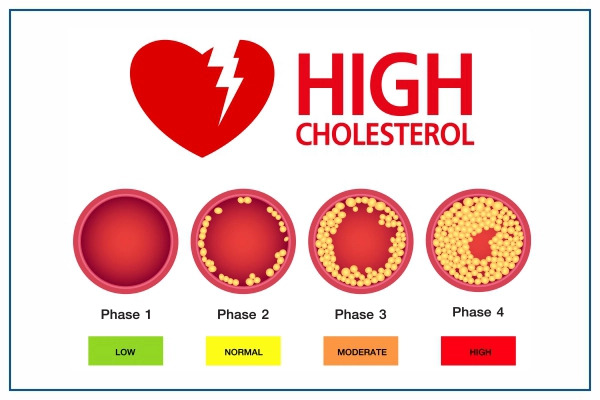Risk of high cholesterol and how it impacts the body
It is crucial to discuss cholesterol, a crucial component of heart health that affects millions of Indians, as high cholesterol cases rise. Indians are more likely to get heart disease at a younger age than those in many other countries of the world, which is an increasing cause for concern. Heart health is greatly influenced by cholesterol, hence it is concerning that almost 6 in 10 Indians have excessive LDL cholesterol levels. Understanding it may therefore hold the secret to preventing heart problems.

What is Cholesterol? And Its types
A waxy, fat-like molecule called cholesterol is essential for many body processes, including hormone production and digestion. Low-Density Lipoprotein (LDL) and High-Density Lipoprotein (HDL) are the two main varieties. LDL cholesterol, sometimes known as “bad” cholesterol, has a propensity to build up in your arteries and raise your risk of developing heart disease. As opposed to LDL cholesterol, HDL cholesterol, also referred to as “good” cholesterol, aids in the removal of extra cholesterol from your bloodstream, lowering the chance of blockages.
What high cholesterol mean for you
Heart disease risk can be increased by having high LDL cholesterol and low HDL cholesterol, especially in those with a history of heart attacks. In addition, genetic predispositions, sedentary lifestyles, and dietary practises all increase the risk for Indians. A startling 185 million Indians had excessive LDL cholesterol levels, according to a 2021 study.
“Recently, I have seen that 20-30% of people are prone to cardiovascular diseases because of the high cholesterol levels,” says Dr. Sandeep Chopra, Additional Director of Cardiology at Fortis Hospital in Ludhiana. As many people are ignorant of the connection between cholesterol and cardiovascular problems, it is vital to understand and maintain your cholesterol levels, such as HDL-C and LDL-C.
What causes high cholesterol?
Elevated cholesterol levels can be attributed to both genetic and lifestyle factors. Although you cannot modify your DNA, lifestyle decisions are very important. Higher LDL-C levels can result from bad eating habits, inactivity, smoking, and binge drinking.
Signs and symptoms of high LDL cholesterol: Are they noticeable?
In most circumstances, high LDL cholesterol has an unnoticeable negative impact on your health. Extremely high LDL cholesterol levels, however, can occasionally result in outward signs and symptoms like chest discomfort, breathlessness, and pale skin. Untreated high levels of LDL cholesterol can eventually result in dangerous cardiovascular events including heart attacks or strokes.
To spot any problems early on, routine cholesterol testing are essential. Knowing your LDL-C levels and risk factors enables proactive management and early intervention to safeguard your heart health.
Consultation with your physician or cardiologist is the first step to managing your cholesterol successfully. The target cholesterol for each person may vary depending on their unique risk factors and medical background. It’s critical to comprehend your unique objectives and collaborate with your doctor to reach them.
“In my 30 years of practise, I have encountered more than 80% of patients who suffer from heart diseases due to elevated cholesterol levels even when they have other comorbidities,” says Dr. Sameer Dani, Director, Cardiology Services, Apollo Hospital, Ahmedabad. I frequently emphasise to my patients the value of maintaining appropriate LDL-C readings, eating a balanced diet, and using the right medications. The LDL cholesterol levels in these heart patients are typically kept as low as possible, which is not only safe but also quite helpful in preventing more heart attacks.
Regular screening is crucial to maintaining a healthy heart, controlling your cholesterol levels, and keeping the bad cholesterol at bay, even in healthy individuals. Therefore, it is crucial for heart health to understand cholesterol, particularly LDL-C. High LDL-C frequently progresses silently, though some people may notice symptoms. So take control of your cholesterol and embrace a heart-healthy tomorrow!
